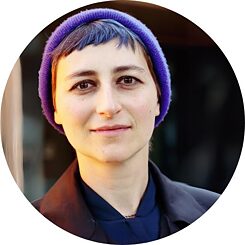Ulrike Almut Sandig
Monsters Like Us

The aftershocks of the tremor that split Germany into two different countries – East and West – until its reunification in 1990 have barely settled. While the fractures aided by this division never fully healed, art and literature have been crucial in the healing process. German poet, performance artist and writer Ulrike Almut Sandig’s elegiac Monsters Like Us is set in the East Germany on the cusp of liberation and reunification but deals with childhood trauma and how it shapes individuals. The book is brimming with tenderness for its broken characters and has been translated by Karen Leeder with meticulous care to retain its mellifluous prose.
By Prathap Nair
Sandig counts Chayavaad poets like Mahadevi Varma, Kashmiri poet Naseem Shafaie, Mizo poet Lalnunsanga Ralte among her favourites, and writers like Arundhati Roy among her inspiration. In this interview, she tells us more about Monsters Like Us.
In contemporary German literature, the once-divided Germany, is fertile ground. Can you tell us about the influence of GDR in Germany's collective memory and literature?
I wouldn't say there is much public awareness of the fact that a significant part of the German population grew up in a socialist dictatorship. East Germans of all ages probably share the sensation that nothing really tastes or smells like it did when they were kids. But being born one year apart makes a huge impact on whether you were taught Russian at school or not, and more so whether you would fear being threatened by the Stasi (the secret police agency of GDR) to write reports on your friends and family or get away with some membership in a useless organisation to prove you are still on the right side. Authors like Lutz Seiler, Katja Oskamp or Clemens Meyer have added East German perspectives to the range of world literature. However, average Germans who don't have any Eastern background would not count the reunification as an important memory of their own. Growing up in a collapsing and deeply absurd system shapes the way we perceive current political threads like Russian imperialism or the rise of the far-right, which is especially strong in East German states.
Even though your book is a "Bildungsroman" set in East Germany, it deals with personal monsters and not political ones. Ruth and Viktor are connected by childhood trauma that ultimately affects them in shaping their adult lives. How did they originate in your writing process?
You see, being East German myself, I perhaps don't make much of a difference between private and public trauma. I know too many families who have experienced how one affects the other. Sexual abuse does happen in all social environments, but the ability to communicate this and call for help is shaped by how exactly you grow up. Viktor is a character that I developed long before I knew I would write this novel. I started off working on some sort of science-fiction story about a young guy who makes his way to Western Europe. But I explored the narrative, the theme of sexual violence surfaced, which scared me. My own daughter was very little back then, and I found it difficult to dive into the topic. So, I wrote two other books instead. By the time I started again with the book just by asking people about anecdotes of sexual violence, so many brutal stories were shared with me. Thus I figured I had to give Viktor a childhood friend. This is how Ruth was born. I wanted to shape their childhood as not traumatic, but rather normal in their own measures. They went through trauma but were also just ordinary East German kids who were good friends, despite being different.
You are an accomplished poet in Germany. Can you tell us about your transition from poetry to prose with "Monsters Like Us"?
It didn't feel like I was changing the genre at all. Besides some poetry books, I had also published two collections of stories that admittedly grew longer and longer, compared to my first ones. But most of all, I seem to write all my fiction with the same core technique. So, there are hardly any handwritten notes, no pinboards, storylines - nothing of what I heard novelists should be doing. Be it a poem or the novel I am working on now, I write without any safety net, just following the sound of language and the questions that rise within.
"Monsters Like Us" deals with heavy themes. How do you approach writing difficult subjects (that you have done so tenderly in the book) like violence, memories of sexual abuse and dysfunctional families?
I did need some years to find the courage for this novel. But once I had really started, I found that the happy and sometimes even funny moments of this story helped me through the hard ones. I had a lot of fun imagining the neo-nazi Viktor working as a nanny for an intellectual French family, and then in the final part of the book (spoiler), I enjoyed how Ruth pushes her boyfriend's car into the abyss of a coal mine valley, and how Viktor takes revenge on the French dad for sexually abusing his stepson. Ruth and Viktor are growing from fragile, traumatized children into self-confident adults, each of them in their own way.
Music is an important part of your work, you are a Klangkünstlerin who works with diverse musicians from across the world (including the Kashmiri fusion rock band Alif) for your on-stage poetry performances. Tell us about how music influences your prose, because there is a strain of classical music running in the background of "Monsters Like Us" too.
As a poet, I guess I am always a bit in love with the sound of things. I have a pop music background but am also a lover of classical music, and sing in a choir for Renaissance music. The novel Monsters Like Us is narrated by Ruth who grows up learning violin and piano, and then later becomes an internationally acclaimed pianist. I didn't listen to music while writing the novel, but Beethoven's Piano Sonata No. 14, the first part of it being known as Moonlight Sonata, provided me with a structure for each part I wrote. I have copied the tempo and character of it in all three parts of my novel, often checking the scales to make sure I am still following Beethoven's flow. And while I was doing it, the moon became a recurring theme in my text itself, bearing witness of the violence happening.
Who are your favourite literary figures? Do you read any Indian authors?
I do! I was lucky to study Indology decades ago. Sanskrit wasn’t my strongest pursuit, but I think it is through ancient texts like the Panchatantra that I understood how metre (rhythmic structure) is the physical and emotional heartbeat of poetry, and how myth defines our narratives. Later I discovered Chayavaad poets like Mahadevi Varma, and the Nayi Kavita movement and fell in love with Harivansh Rai Bacchan's Madhushaala. Now, I would not be able to read much Hindi poetry anymore, but there is so much more of Indian cultures and languages to discover through translation, like the Kashmiri poet Naseem Shafaie or the Mizo poet Lalnunsanga Ralte (Sanga Says). I am a huge fan of Tishani Doshi with whom I even wrote a poem in 2022. When I worked on Monsters Like Us, I tried to find words as tender and sharp as Arundhati Roy’s in The God of Small Things which was a huge success in Germany.
Translating Monsters Like Us was a very special and challenging experience. It is a book of great beauty and tenderness, also humour and lyricism. But it is also a book that explores violence and abuse. It was important to me to get the tone right. In German, one understands many things between the lines; things that hover between repressed recall, knowing and dream. In fact, the book turns on the stories (and lies) we tell ourselves in order to be able to live with such knowledge. It was important to preserve that dreamlike quality without sacrificing the truths that are trying to be heard. I have previously translated Ulrike Almut Sandig’s poetry and was familiar with the musicality, the rage and the irony. Also, the ambition: it is a very political book that works on multiple layers. What was new was getting to know these amazing characters; characters whose voices I could hear in my own head by the end. Translation is so important, especially in a globalised world. It is what keeps us alive and truly opens us to the world. This book, for example, charts the brutality and absurdity of the totalitarian state of East Germany, but also the violence and chaos that rushed in to fill the void after its collapse. We experience, understand and can expand our own sympathies to comprehend that other life in its fullest sense.
About the Author
Ulrike Almut Sandig is a writer and performance poet living in Berlin. She has published poems and stories, music albums and radio plays as well as the highly acclaimed novel Monsters Like Us. As the frontwoman of the German-Ukrainian poetry collective “Landschaft”, she makes poems dance in a fusion with film and electronic music. For her stage performances, she often translates poetry from other languages, especially English and Ukrainian. Most recently, her adaptation of "Funkhaus", the poems of queer Māori poet Hinemoana Baker, was published.She also writes for the German Language Column of the Goethe-Institut.

